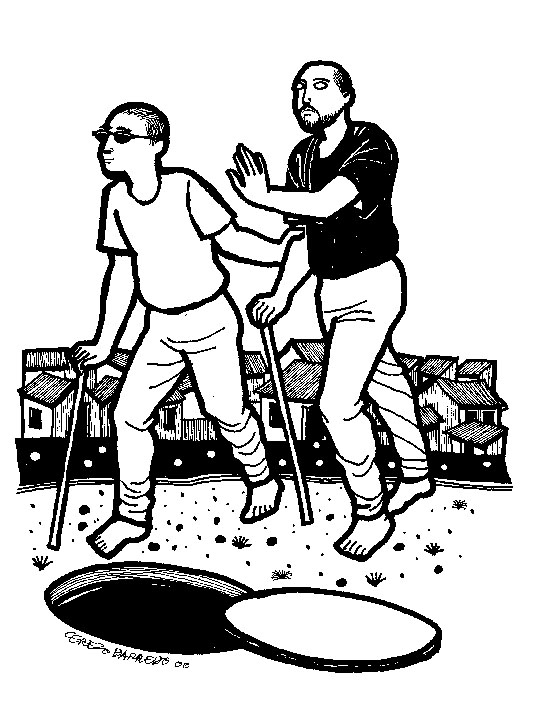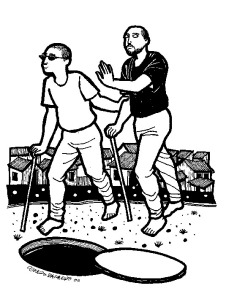Tagged: Blind Leading the blind

Jesus, Our Lord and Optician ~ Br. Jay Van Lieshout, Postulant
Jesus told his disciples a parable:
“Can a blind person guide a blind person? Will not both fall into a pit? No disciple is superior to the teacher; but when fully trained, every disciple will be like his teacher.
Why do you notice the splinter in your brother’s eye, but do not perceive the wooden beam in your own? How can you say to your brother,
‘Brother, let me remove that splinter in your eye,’ when you do not even notice the wooden beam in your own eye? You hypocrite! Remove the wooden beam from your eye first;
then you will see clearly to remove the splinter in your brother’s eye.”
Jesus loved parables; and rightfully so, they are an excellent way of teaching, of conveying concepts and are a continuation of the techniques in the Torah. Today’s gospel shows how well this teaching technique can be used to present ideas in a way that withstands the cloudy nature of time. But there is another side to parables, a side again well used in this gospel: you can critique people without ever pointing a finger or mentioning names and yet it will be clear about who or what the parable is referencing; it is in this manner that Jesus aims strip us of our arrogant ways so that we may begin to walk in his footsteps.
Jesus has found the perfect “teaching moment” for his disciples and one that they and all of us need if we hope to spread the good news. We know that Jesus thought of the practices of the Pharisees and Sadducees, and one can imagine that his disciples would gossip and lambaste the church leaders among themselves as well as to those they encountered. We also know that this type of behavior is contrary to Jesus’ methods of conflict resolution and the path to salvation. Thus, we have the parable of the blind leading the blind. It’s important to note that Jesus prefaces this parable with teachings on loving one’s enemies and the perils of judging and condemning others the result of which will be return judgment and condemnation. But if you love your enemy and forgive them their transgressions, this favor will be returned and “A good measure, pressed down, shaken together and running over, will be poured into your lap. For with the measure you use, it will be measured to you.”
Now the parable begins with Jesus rhetorically asking his disciples “Can the blind lead the blind? Will they not both fall into a pit?” On the surface this seems to be an almost comic image about the visually impaired, but underneath the disciples understood Jesus was referencing the blind of faith, those who know and enforce the law but are blinded to their own transgressions, such as the Pharisees and Sadducees, and the pit isn’t a hole in the ground, but is the eternal grave that such arrogance digs here on Earth. It is very likely that the disciples immediately understood the implications of this parable and, before one of them could utter the standard “but Rabbi” , Jesus turns his attention to his followers and says “No disciple is superior to the teacher; but when fully trained, every disciple will be like his teacher.” This is clearly meant quell their growing self righteousness and remind them they still have a long journey, much to learn and even more to change before they are ready to fill his shoes.
I surmise that there must have been some discussion and perhaps even rumblings among the disciples after Jesus so aptly adjusted their attitudes, though any such parlay has was not recorded by the writer of Luke. Yet the next few stanzas of this gospel are a pointed critique and chastisement of one or more of his student’s seemingly lofty and pretentious behavior. “Why do you notice the splinter in your brother’s eye, but do not perceive the wooden beam in your own? How can you say to your brother, ‘Brother, let me remove that splinter in your eye,’ when you do not even notice the wooden beam in your own eye? You hypocrite! Remove the wooden beam from your eye first; then you will see clearly to remove the splinter in your brother’s eye.” I imagine the wide eyed and astonished look on his disciples faces in response to this stern tongue lashing by their Mentor. But, like all of us now and then, they needed to learn an important message if they ever hoped to emulate their teacher: don’t judge other’s behavior until you are sure that your behavior is above reproach!
We all must consider how our actions are perceived in the eyes of those around us. To them we are no better than the way we act and if our actions do not reflect our words we are no better than a liar and a fraud. Jesus is reminding us that we must focus on KNOWING and CHANGING ourselves on the inside and only then could we be like the teacher and lead by example. Jesus finishes this lesson with a charge to his disciples to actively respond to his words for “someone who listens and does nothing is like the man who built a house on soil, with no foundations; as soon as the river bore down on it, it collapsed; and what a ruin that house became!”
Like the original disciples, we must see our own flaws, hear the words of Jesus and with them build a foundation of love and mercy, of openness, forgiveness and unity and equality. Only then will our eyes be clear enough to guide the blind in faith past the perilous pit and follow in the footsteps of our Lord and Teacher.


You must be logged in to post a comment.